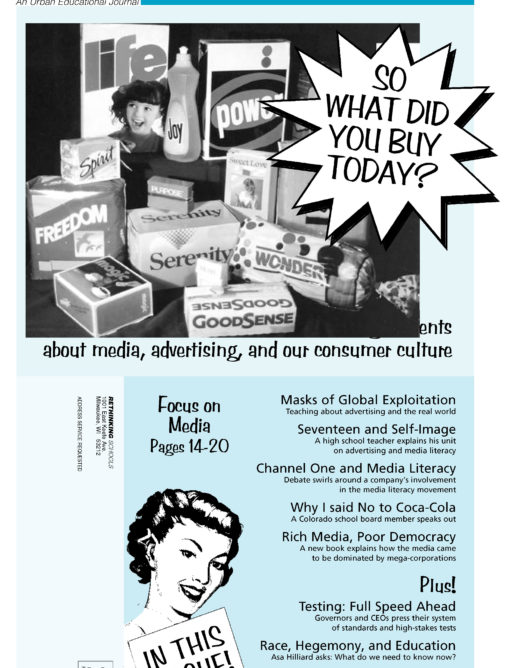Editorial: Moving Beyond ‘Media Literacy
When looking at media literacy, tough issues arise, in particular issues of commercialism (too much) and democracy (not enough).
The press reports regularly on mergers or buy-outs of one media/telecommunications company or another. Educators, like many people, often pay little attention to such stories. Their concern is focused on the more obvious manifestations of media influence, such as infestations of Pokmon cards or infatuations with the newest video game.
Yet what happens at the top of corporate media, that is, who controls our media, directly influences the lives of students and classrooms. Concern needs to move beyond what has come to be known as “media literacy.” We need to delve into the tough issues that lurk underneath. In short, those issues are commercialism and democracy.
The defining reality about the media is that the tremendous power of communications technology – from radio to the Internet – has been placed in corporate hands for commercial purposes and private profit. Even where substantial public resources (e.g., the airwaves, the academic/governmental creation of the Internet) were indispensable to the development of media networks, corporate power has been allowed to subjugate the networks so as to serve corporate ends.
COMMERCIALISM
Commercialism increasingly infects every public (and “private”) space, making the values of the market the dominant criteria by which everything is judged. The new corporate media giants play a central role in this “hypercommericalism.” A movie is no longer just a movie – but an international corporate campaign that shapes the consciousness of hundreds of millions of people. Toy figurines are “given” away at the local fast-food place, glowing “reviews” of the movie are broadcast over TV networks owned by the corporation that produced the movie, and a plethora of paraphernalia hits the market, from trading cards to interactive video games.
The amount spent on the promotion of products ranges into the billions. According to Robin Templeton, former program director of the anti-commercialism group UNPLUG, “A greater proportion of the GNP is spent on advertising than on education.” Schools, once relatively free of overt advertising influence but now increasingly deprived of resources, find it necessary to flash brand names and logos in front of students on everything from commercially produced curriculum to fieldhouse scoreboards.
Behind such commercialism stand deeper issues of private profit and corporate control – the driving forces of economic and social life. School-based activities, such as annual No-TV weeks, are important beginnings. But ultimately, critical media literacy has to question the values and social structures that lead media to serve private profit rather than public interest.
DEMOCRACY
As Stan Karp points out in his review of Rich Media, Poor Democracy, by Robert McChesney, the concentration of a few global media empires among a tiny number of people threatens the very notion of informed public discourse and participatory democracy. A media system forced to serve consumption and profit is not compatible with an informed citizenry. Complementing this is an electoral system that also serves private interests. The same 1% of the U.S. population that owns 40% of U.S. wealth has a similarly disproportionate influence on the electoral process. McChesney puts it this way: “The corporate media cement a system whereby the wealthy and powerful few make the most important decisions with virtually no informed public participation.”
The tools of social dialogue and mass communication are too important to be privately deformed in order to better sell deodorant or $100 Nike shoes (not to mention selling presidents). At a minimum, a public/educational sector of media should exist free of profit interests and substantially supported by the government so that democratic debate could exist independently of corporate power. Unfortunately, given cutbacks in public funding of public radio and television, the opposite is happening.
Educators have a particular responsibility to take up media issues. We see the impact of the media on young minds. We know the potential of quality dialogue and study in schools free of commercial influence. We understand the threat that public institutions – such as public schools and public television and radio – now face from profiteers and free-market ideologues.
Addressing the various topics surrounding media and corporate power is not easy. Yet given their importance we have no choice. We hope that the articles and resources provided in this issue of Rethinking Schools help move our teaching and organizing forward.

